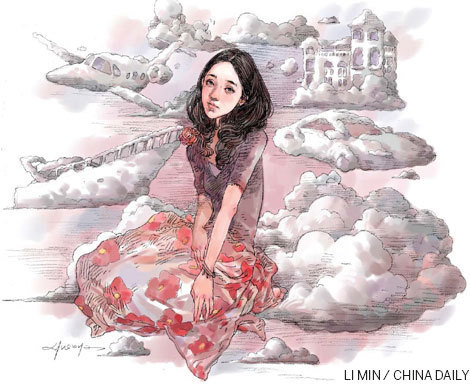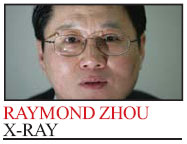
Starlets want to marry into wealth not only for financial security but for social status. Where love fits into the equation is every couple's closely guarded secret, but public obsession hints at conflicting values.
If Cinderella were alive today, she would probably have a prenuptial agreement. What if the prince breaks up with her? An aging princess has got to live in grand style. She cannot go back to her old ways of sweeping the floor, can she?
Now imagine the king with premonitions of the future. He would disapprove of his son's marriage exactly because he suspects - rightly or wrongly - that she is interested mostly in the money.
Isabella Leong has been called a "Cinderella" by the media. The singer-actress is making headlines again, as she has always done, that have nothing to do with her singing or acting. You see, Richard Li, the man with whom she has had three sons, has a father who happens to be the richest man in Asia.
They are not married, not formally. It was reported his father objected. This week, they announced their breakup. Instead of showing sympathy, online voices are congratulating her on "getting her freedom and her money yet miraculously not throwing away her youth", meaning she did not linger in the relationship for too long.

Richard Li has denied a settlement or a pre-existing contract that would grant her HK$3 billion ($385 million), covering her expenses as well as those of their children. He has also denied the involvement of other women.
Tabloid gossip derives its entertainment value from subtle suggestions. When the couple first dated, there were all kinds of conjectures. Those were largely quelled with the arrival of the boys, a pair of twins among them. A romantic aura danced around the story. Now that it's splitsville, people talk about it as if Leong had a master plan to begin with.
I have little interest poking my nose into the private affairs of the rich and famous. What happens between two consenting adults is their own business. But the chemistry between a 44-year-old businessman, let alone heir to a business empire, and a 22-year-old entertainer may be more than physical or romantic.
If you look back 100 years, it was quite common in China for female entertainers to marry older, richer and more powerful guys. It's not all cultural. In the West, tycoons have trophy wives, too. When an ingenue starts out in the cut-throat world of entertainment, she may encounter outsiders - people not of her industry - who are willing to support or sponsor her, or buy her expensive gifts. I've heard of some well-known art schools surrounded by luxury sedans at weekends ready to pick up female students, creating quite a scene of upward mobility, or rather, the short-cut to inheritance.
Of course, one should not automatically brush this aside as corruption of the young and the loss of innocence. Who can guarantee there is no love in this kind of pairing? Human emotion is complicated and what starts as a vanity project may turn into Romeo and Juliet style intensity.
What truly puzzles me is the phenomenon of established stars jostling for attention by the super-rich. We all know celebrity entertainers earn a lot - not only in their prime, but even after they are over the hill. China has its equivalent of Las Vegas, where no-longer-popular stars keep plowing in smaller but steady incomes via commercial appearances and county-level variety shows.
The suggestion that they marry into wealth purely for the sake of wealth can hardly hold water. As actress Fan Bingbing once retorted, "Why should I? I am wealth incarnate myself." She spoke the truth and got my respect.
Singing and acting can bring fame and fortune galore, but traditionally they do not lead to social stature. The old Chinese word for "actor" is xizi, which is derogatory. Only a few, such as Mei Lanfang, rose above it and attained a high level of respectability. I have always suspected that the norm of men playing female roles in some traditional arts was partly necessitated by the reluctance of women to get into the business considered promiscuous by the populace.
This stigma was more or less gone with the founding of New China when the title "artist" became a be-all and end-all moniker. Even today, mainland actresses, at least the superstars, seem to be more career-oriented than their Hong Kong and Taiwan counterparts. Even when they marry billionaires, they often do not quit their day job in the arts and entertainment. If anything, some seem to use power and money to advance their career.
From media interviews, I get the impression that many women in Hong Kong and Taiwan treat a stint in the industry as a passage to a household of enormous affluence. To ensure she does not come with the perceived stink of the industry, the patriarch or matriarch would demand that she cease her work and be a full-time housewife.
Well, there is nothing to be ashamed of in being a housewife. Former United States First Lady Barbara Bush exudes self-confidence in defending her role. But it surprises me that so many professionally accomplished women see their career as only a phase.
Of course, this is a good profession to fall back on - even after a long absence. Leong is reportedly set to star in an upcoming Tsui Hark project. Others have ventured out of their bridal chamber once their husbands lost their fortune. But public response invariably implies pity, as if it's a fall from grace.
A beautiful actress walking down the aisle with a not-so-old bigwig could embody many things, depending on your perspective, a perfect union of beauty and bounty for one. Sometimes, public reaction tells more about the times than the practice itself. The website iFeng.com is running a survey, asking people if they, given the chance, would be willing to be in Leong's shoes. The responses are almost evenly divided.
I browsed through some of the comments. It seems most who said no to the Leong scenario tended to see the three kids as her baggage. In other words, if she had not become a mother, the deal would have been worthwhile - whatever it includes.
Sometimes I get the feeling people are too focused on worldly achievement. Wouldn't the kids be a wonderful reminder of the couple's love if they had truly loved each other, as they claim? Juggling three kids with a high-octane career, even without a largesse of palimony, is possible. Many Hollywood actresses have done it.
Ultimately, people, including larger-than-life celebrities, have a right to choose their own path of life. It's funny people making a few thousands of yuan a month worry about the livelihood of those making hundred times more.
Truth is, Chinese evaluating marriages are very conscious of social status, which is manifested in power or wealth. Happiness seems an afterthought. Otherwise, how can we tell Leong was happy in the relationship?
raymondzhou@chinadaily.com.cn
相关阅读:
Something's funny about the bunny
(作者周黎明 中国日报网英语点津 编辑陈丹妮)
